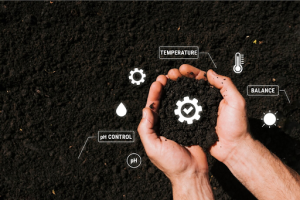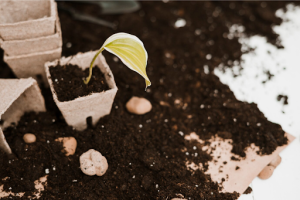Introduction
Have you ever wondered why some plants grow tall and strong while others seem weak and small? The secret often lies in the soil! Organic plant soil is like a superfood for plants, providing them with the nutrients they need to thrive. This special type of soil is made from natural materials like compost, leaves, and even kitchen scraps, helping to create a healthy environment for plants to grow.
When you use organic plant soil, you not only help your plants but also protect the environment. This soil is full of tiny living things, like worms and microbes, that work together to keep it rich and full of life. Choosing organic soil means you are choosing a way to garden that is good for the Earth and supports strong, vibrant plants. In this article, we will explore why organic plant soil is the foundation for healthy and vibrant plants, how to make it, and the amazing benefits it brings to your garden. Let’s dig in and discover the wonderful world of organic gardening together!
Understanding Organic Plant Soil
Organic plant soil is special because it is made from natural materials that help plants grow strong and healthy. Unlike regular soil, organic soil is rich in nutrients and is free from chemicals that can harm the environment. It includes ingredients like compost, which is made from decayed leaves and food scraps, and animal manure, which adds important nutrients. When you use organic plant soil, you create a cozy home for tiny living creatures like worms and beneficial microbes. These little helpers break down organic matter, making it easier for plants to absorb the nutrients they need.
Using organic plant soil also helps the Earth. It improves soil structure, which means it can hold water better and support more life. This type of soil encourages biodiversity, allowing different plants, insects, and animals to thrive. By choosing organic plant soil, you are making a choice that benefits both your garden and the planet. In this section, we will dive deeper into what organic plant soil is and why it is the foundation for healthy and vibrant plants. Understanding these concepts will help you become a better gardener and enjoy the beauty of thriving plants!
Key Components of Organic Plant Soil

Organic plant soil is made up of several important parts that work together to help plants grow strong and healthy. The first key component is organic matter, which includes things like compost, leaves, and grass clippings. This material not only adds nutrients but also improves soil texture. Another essential part is beneficial microbes and worms, which help break down organic matter, making it easier for plants to absorb the nutrients they need.
Good organic soil also contains vital minerals like nitrogen, phosphorus, and potassium, which are essential for plant growth. These nutrients help plants stay vibrant and full of life. Additionally, organic plant soil retains moisture better than regular soil, preventing your plants from drying out quickly. By understanding these key components, you can see how organic plant soil is truly the foundation for healthy and vibrant plants in your garden!
Benefits of Using Organic Plant Soil
Using organic plant soil comes with many great benefits that help your garden thrive. First, it provides essential nutrients that plants need to grow strong and healthy. This type of soil is full of organic matter, which feeds the plants and encourages vibrant growth. Another benefit is that organic soil improves the overall health of your garden. It helps maintain a balanced ecosystem by supporting beneficial insects and microorganisms that keep pests away.
Organic plant soil also retains moisture better than regular soil, which means your plants will stay hydrated for longer periods. This is especially helpful during hot, dry days! Additionally, using organic soil is good for the environment because it reduces pollution from chemicals. By choosing organic plant soil, you are not only ensuring healthy plants but also helping to protect the planet. It truly is the foundation for healthy and vibrant plants in your garden!
How to Create Your Own Organic Plant Soil
Creating your own organic plant soil is fun and easy! Start by gathering materials like kitchen scraps, dried leaves, and grass clippings. These items are great for adding nutrients to your soil. Next, you can make compost by mixing these materials together in a pile or a compost bin. Be sure to turn the compost every few weeks to help it break down faster. After a few months, your compost will turn into rich, dark soil.
Once your compost is ready, mix it with garden soil to create organic plant soil. You can also add other organic materials like well-rotted manure or peat moss to improve texture and water retention. Test the soil to check if it has the right balance of nutrients for your plants. By making your own organic plant soil, you will give your plants a healthy foundation for growing strong and vibrant!
Common Mistakes to Avoid with Organic Plant Soil

When working with organic plant soil, avoiding certain mistakes can help keep your plants healthy and vibrant. One common mistake is using too much water. Overwatering can make the soil soggy and lead to root rot, which harms plants. It’s important to check if the soil is dry before watering again. Another mistake is not adding enough organic matter. Organic plant soil needs compost, leaves, or grass clippings to provide essential nutrients. Without them, your plants may not grow well.
Many gardeners also forget to mix their soil. Using only one type of organic material can create an imbalance. Mixing different ingredients, like compost and manure, helps improve soil quality. Finally, don’t skip soil testing! Testing your soil helps you understand its nutrient levels, ensuring your plants get what they need. By avoiding these common mistakes, you can make sure your organic plant soil remains the foundation for healthy and vibrant plants!
FAQ’s
- What is organic plant soil?
Organic plant soil is made from natural materials like compost, leaves, and manure. It provides essential nutrients for plants and supports beneficial organisms that help with growth. - Why is organic plant soil important?
Organic plant soil is crucial because it helps plants grow strong and healthy. It retains moisture better, reduces chemical pollution, and promotes a thriving ecosystem in your garden. - How can I make my own organic plant soil?
To create organic plant soil, gather kitchen scraps, dried leaves, and grass clippings. Mix these materials to make compost, then blend it with garden soil to enrich it with nutrients. - What are the key components of organic plant soil?
Key components include organic matter (like compost), beneficial microbes and worms, and essential minerals such as nitrogen, phosphorus, and potassium.
Conclusion
In conclusion, organic plant soil is truly the foundation for healthy and vibrant plants. By using natural materials like compost, leaves, and animal manure, you create a rich environment that helps plants grow strong. This type of soil not only provides essential nutrients but also supports beneficial organisms like worms and microbes that keep your garden thriving. Remember, creating and maintaining organic plant soil requires understanding its key components and avoiding common mistakes.
By ensuring your soil has the right balance of organic matter and moisture, you can help your plants reach their full potential. Choosing organic practices also benefits the environment, making it a great choice for your garden and the planet. Now that you know how important organic plant soil is, you can start your gardening journey with confidence. With these tips, your plants will flourish, bringing beauty and joy to your garden!
Read More : Benefits of Field Pea Cover Crops

